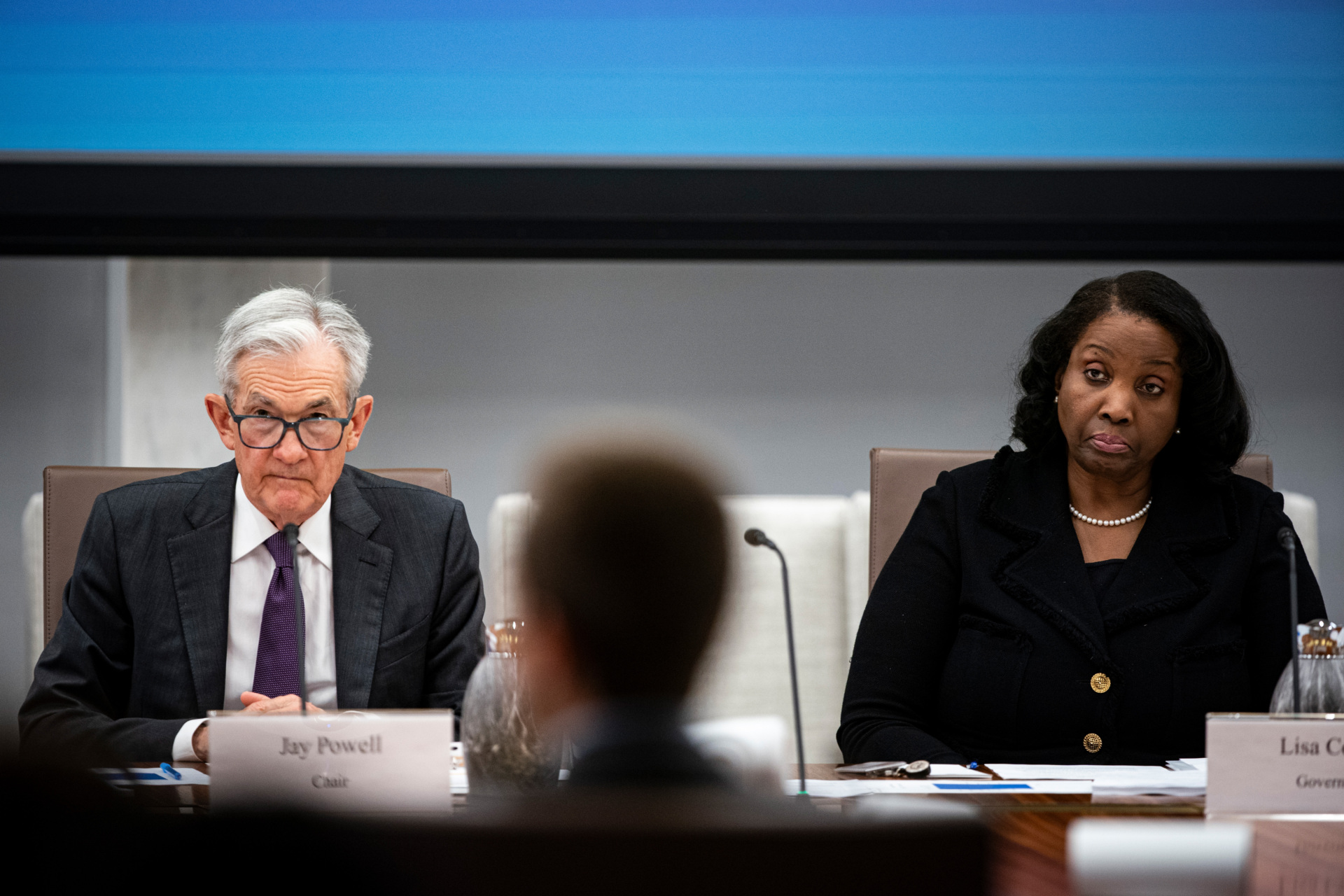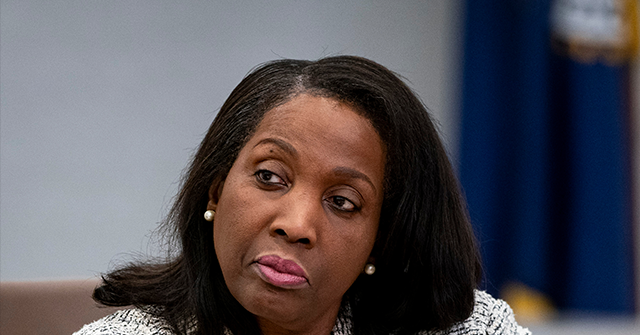Trump Is Likely to Win in His Fight with Fed Governor Cook
Federal Reserve Governor Lisa Cook’s attempt to overturn her removal faces long odds. The controlling doctrines point to a narrow judicial role here, and even a win on the merits would most likely yield back pay, not a return to Constitution Avenue. If you strip away the noise and look at how courts actually handle “for-cause” removals, Cook’s case is uphill on every material point.
The strongest thing Cook has going for her in the fight against President Donald Trump is that the Supreme Court has already signaled that it will likely uphold the for-cause tenure Congress gave Fed governors. While the Justices have been striking down similar for-cause tenure provisions for many agencies, bureaus, and commissions, the Supreme Court went out of its way in a recent emergency order to say that its reasoning in those cases—basically, that the limits on removal unconstitutionally infringe on the independence of the executive branch—does not apply to the Federal Reserve.
“Finally, respondents … contend that arguments in this case necessarily implicate the constitutionality of for-cause removal protections for members of the Federal Reserve’s Board of Governors or other members of the Federal Open Market Committee (FOMC). We disagree. The Federal Reserve is a uniquely structured, quasi-private entity that follows in the distinct historical tradition of the First and Second Banks of the United States,” the Court said.
Although the court did not spell it out in detail, one of the key features that makes the Fed’s structure unique is that it is designed to perform a legislative function rather than an executive function. The Constitution assigns to Congress the power to “coin Money, regulate the Value thereof.” The Supreme Court has interpreted the power to coin money and regulate its value to include the authority to regulate every phase of currency, including chartering banks. In other words, monetary policy belongs to Congress, not the executive, and Congress likely has more leeway to impose removal restrictions on a central bank carrying out a Congressional power.
But the Court is likely to be reluctant to micromanage what qualifies as “cause” inside that distinctive regime. Section 242 of the Federal Reserve Act is terse: governors serve 14 years “unless sooner removed for cause by the President.” It does not define “cause,” mandate a hearing, or set an evidentiary burden. When Congress writes a sparse standard for a uniquely independent institution, courts generally read that as a reason for restraint, not a license to invent criminal-style procedures.
No Hunt for the Real Motive
Many commentators have argued that the mortgage fraud allegations are mere pretext for policy retaliation. That is unlikely to carry the day. In the canonical removal cases, the Court assessed the legal sufficiency of the reason offered, not the president’s “real motives.” If the White House presents a facially valid basis—here, integrity concerns tied to a financial transaction—judges typically decide whether that fits the statutory category of “cause,” full stop.
The Supreme Court’s recent decision in Trump v. United States reinforces why courts won’t probe presidential motives here. The Court made clear that judges “may not inquire into the President’s motives” when there are facially valid reasons for executive action, warning that such inquiry would be “highly intrusive” and risk exposing official conduct to examination based on “mere allegation of improper purpose.” This doctrine applies with particular force when, as here, the stated reason involves financial misconduct allegations supported by documentary evidence. Courts are meant to assess whether mortgage fraud concerns constitute valid “cause” under Section 242, not to psychoanalyze whether the president’s true motivation was policy disagreement.
Front row, left to right: Associate Justices Sonia Sotomayor, Clarence Thomas, Chief Justice John G. Roberts, Jr., Associate Justices Samuel A. Alito, Jr. and Elena Kagan. Back row, left to right: Associate Justices Amy Coney Barrett, Neil M. Gorsuch, Brett M. Kavanaugh and Ketanji Brown Jackson. (Photo: Collection of the Supreme Court of the United States)
And even if a court glanced at context, the policy-retaliation story doesn’t really add up. Removing one governor from the 12 member Federal Open Market Committee does not shift monetary policy, and Cook’s rate stance at the last meeting was reportedly shared by nearly all other participants. That makes it hard to argue the true aim was to change the outcome on interest rates.
Cause Isn’t a Conviction
Because §242 supplies no procedures or burden, courts are not going to graft a “beyond a reasonable doubt” requirement—or anything close—onto a presidential removal. The right question isn’t “Can the President prove fraud?” but “Is there a non-frivolous evidentiary basis for believing conduct occurred that reasonably bears on fitness to serve on the nation’s bank-regulatory board?”
If the administration puts forward contemporaneous documents supporting the allegation that two incompatible primary-residence attestations were signed two weeks apart, that will likely clear the threshold to let the removal stand while litigation proceeds. Courts have been especially wary of yo-yoing officials in and out of office during suits. The institutional bias of our judicial system is toward stability now and damages later.
Some of Cook’s advocates have pointed out that the alleged misconduct predates her Fed service. That matters, but it isn’t dispositive. In other federal contexts, pre-appointment dishonesty can be “cause” because it goes to candor and suitability. The key is nexus: does the evidence credibly show misrepresentation in a financial transaction such that a banking regulator’s integrity is implicated? If the answer is yes, courts will not say “too old” or “too private” simply because the paperwork came before the oath.
Win the Case, Lose the Seat
Even if Cook were to win on the merits, perhaps convincing the court that the for-cause threshold has not been met, she’s still unlikely to keep her seat on the Fed board.
The Supreme Court has long-avoided directly ordering the government to continue to employ officials in the face of a purported presidential removal. When removals are held unlawful, the historic remedy is back pay or relief aimed at subordinate officials, not an injunction to the Oval Office. For a sitting Fed governor, that remedial pattern matters more than any lofty rhetoric about independence. It means Cook’s best-case courtroom outcome looks like a paycheck or a pension, not reinstatement. That reality weakens the litigation leverage and underscores why front-end injunctions are so hard to obtain.
But this is not entirely clear-cut. In Cook’s case, the Supreme Court could avoid ordering the president of the United States to do anything at all. It could instead order Fed officials to treat her as a sitting governor. That would effectively keep her in office—providing at least a narrow path to victory for Cook.
Independence by Design
Allowing this removal to stand does not hand any president a joystick for monetary policy. A replacement must still be nominated by the president and confirmed by the Senate. Fourteen-year, staggered terms dilute the impact of any single appointment. And the Federal Open Market Committee is a 12-vote body that includes Reserve Bank presidents; one vacancy or one new governor rarely moves outcomes by itself. If a White House overreaches on “cause,” the confirmation process is the proper venue for pushback.

Federal Reserve Chairman Jerome Powell, left, and Federal Reserve Governor Lisa Cook attend the FOMC meeting in Washington, DC, on June 25, 2025. (Al Drago/Bloomberg via Getty Images)
Add those strands together and the court’s likely posture comes into focus. Justices will preserve the existence of a for-cause constraint for the uniquely structured Federal Reserve, but they won’t inflate that constraint into a criminal code or a roving license to interrogate presidential motives. They will ask whether the administration has some competent evidence of conduct that, if true, undermines a governor’s fitness for a financial-regulatory role. If so, the removal is likely to remain in place while the case winds through the courts. And even if Cook ultimately wins, the payoff will almost certainly be compensation, not a judicially ordered return to the Board.
The independence of the Federal Reserve matters for American economic stability. But that independence is best preserved by the architecture Congress built—Senate confirmation, long staggered terms, a multi-member FOMC—not by inviting courts to supervise personnel decisions in real time. The unique structure already recognized by the Supreme Court is the safeguard rather than orders from the judicial branch.
On the law as it stands, Cook’s challenge is unlikely to succeed on the front end, and even a back-end victory would be mainly symbolic.
Read the full article here
